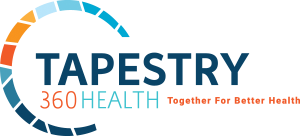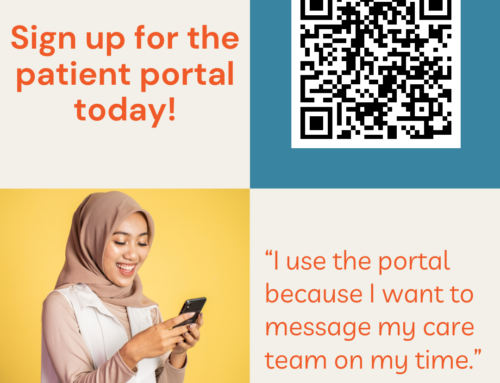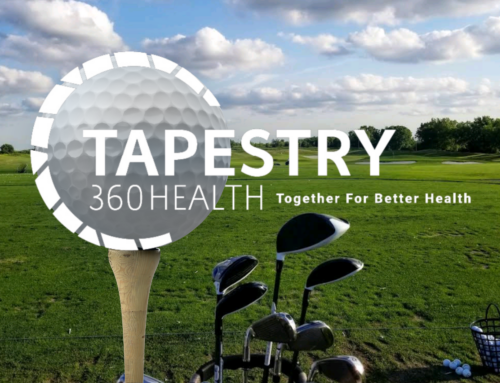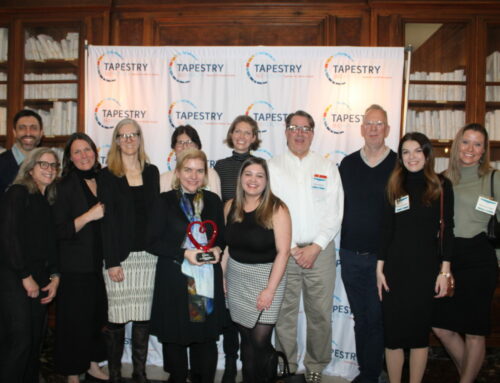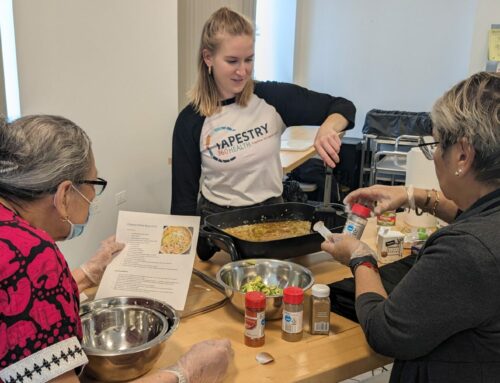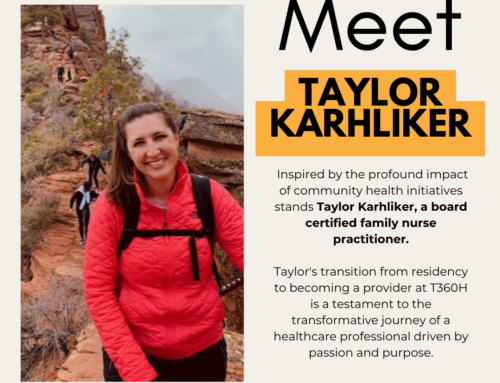News
Catching up with School Based Health Centers in the time of COVID: Q&A with Sheryl Dubinsky
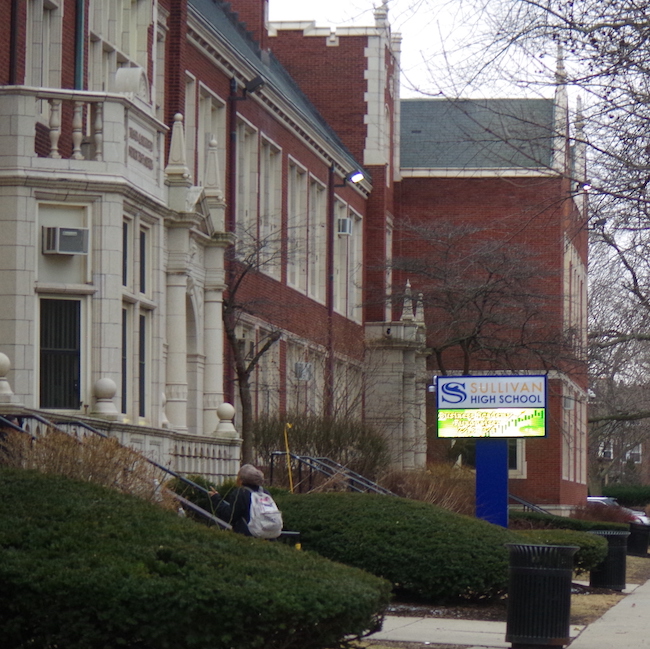
Photo: Sheryl Dubinsky is the counselor at Sullivan High School
When schools closed in March 2020 due to the COVID-19 pandemic, counselors worked with students remotely and sent students to community clinics for procedures (including free family-planning care and prescriptions at our Tapestry Wilson clinic).
With schools reopening, we asked counselor Sheryl Dubinsky, LCPC, to share a bit about how our SBHCs adapted to deal with COVID-19.
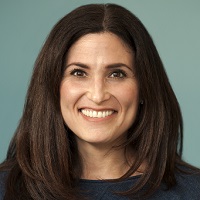
She is a Licensed Clinical Professional Counselor, and received her master’s degree in human services counseling from National Louis University.
Her professional interests include child/adolescent/family counseling, anxiety and depression, divorce adjustment, parenting, eating disorders, and anger management. For more information, visit HHC’s School-Based Health Clinics’ webpage.
Q: What is a School-Based Health Center?
A: Heartland Health Center’s school-based clinics provide urgent, primary care health care and dental services to students. We provide a welcoming space convenient for both students and parents where we address a myriad of physical and mental health concerns. These services have a positive impact on student well-being and academic success and are a model for the nation. In 2019 we had 11,000 patient visits across our SBHCs.
Q: What is your role at HHC’s School Based Health Centers (SBHCs)?
A: I lead the behavioral health team, which includes four other counselors and myself at seven schools. I also serve as the behavioral health counselor at Sullivan High School. We provide individual, group and family counseling, as well as counseling on nutrition and physical activity, and substance abuse, and psychiatry referrals. (We have 7 schools, there are 3 social workers, 1 PhD, and myself, a counselor).
Q: Why are these clinics so important?
A: So many kids would miss out on help they need if we didn’t have school-based health centers. Having a connection with someone outside the family is really important. At the clinic, they can talk to a counselor who validates their feelings and supports them in the classroom. Students can reach out by email anytime – since the start of the COVID-19 pandemic, we’ve been able to set-up meetups by phone and computer during the day.
Q: How has the way you connect with students changed during COVID-19?
A. Prior to COVID-19 we saw students in the clinic. We were there for the medical provider to give us a Warm-Handoff if they felt the student would benefit from mental health services. Since March 2020 we have been meeting with students virtually. In November 2020, clinics reopened for the students to be able to come in and get physicals, sports physicals, and counseling. Some of our counselors are going into elementary school classrooms virtually to do a feelings check-in or teach coping skills.
Q: What are some of the challenges with virtual visits?
A: For the most part, the virtual sessions have been successful. Sometimes it’s hard for students to have privacy online, and they may not want their parents to know they’re seeing someone. Yet if we didn’t have virtual visits, so many kids would not get the help they need during this difficult time.
Q: How have students fared during the pandemic?
A: We see a lot of depression, anxiety, loneliness, frustration, anger and lack of motivation for learning in both high school and elementary age kids. Their teachers don’t always know what’s going on behind the computer screen at home. Their parents may have lost their jobs and there may not be enough to eat. High schoolers may be caring for siblings, helping them with remote learning and feeding them, and they may miss their extracurricular activities. Some students are working to help support their family. Some stay up all night and then sleep through their classes during the day.
Q: What about elementary school students?
A: In many ways, remote learning may be hardest on this age group. They don’t have as many ways to connect with friends, such as through social media, and may feel really isolated. Many are stuck at home and lack physical activity. Those with learning disabilities face even more challenges.
Q: How do students feel about coming back to the classroom?
A: Some can’t wait, but others are afraid. They may have had a family member who passed on or got really sick from COVID-19.
Q: What are some examples of students who really needed help and were able to receive mental health services during the pandemic?
A: One student came to me with hallucinations, depression and anxiety. I referred him to a psychiatrist, but he didn’t want to take medication. When he started vomiting and seeing flashing lights, I sent him to a medical provider, they sent him for an MRI. Once any physical issues were ruled out, the student felt much better and opened up to working on his mental health. He’s playing soccer again, and during our weekly sessions, I’ve noticed an improvement in his facial expressions and mood.
Another student came to one of our social workers with suicidal ideations. The student was referred to Screening Assessments and Support Services through the Chicago Public Schools. The student did not need hospitalization, and says she feels better by talking regularly with her HHC counselor.
Q: How do you feel about your work?
A: I’m very grateful to be able to provide support and guidance for these kids, and by extension their families, during these really difficult times. I can’t wait until the students are back in school and have more immediate access to our clinics.
Note: Tapestry 360 Health operates school-based health centers in 4 local high schools – Roosevelt, Senn, Sullivan and Uplift – and 3 elementary schools – Gale, Hibbard, & Kilmer – in Albany Park, Edgewater, Rogers Park and Uptown.
You can also read more about our student services or school physicals, or view our SBHC locations. We’re also grateful to our partners at SMART Student Health and their fierce advocacy for student-based health centers.
Photo: Sheryl Dubinsky is the counselor at Sullivan High School
When schools closed in March 2020 due to the COVID-19 pandemic, counselors worked with students remotely and sent students to community clinics for procedures (including free family-planning care and prescriptions at our Tapestry Wilson clinic).
With schools reopening, we asked counselor Sheryl Dubinsky, LCPC, to share a bit about how our SBHCs adapted to deal with COVID-19.

She is a Licensed Clinical Professional Counselor, and received her master’s degree in human services counseling from National Louis University.
Her professional interests include child/adolescent/family counseling, anxiety and depression, divorce adjustment, parenting, eating disorders, and anger management. For more information, visit HHC’s School-Based Health Clinics’ webpage.
Q: What is a School-Based Health Center?
A: Heartland Health Center’s school-based clinics provide urgent, primary care health care and dental services to students. We provide a welcoming space convenient for both students and parents where we address a myriad of physical and mental health concerns. These services have a positive impact on student well-being and academic success and are a model for the nation. In 2019 we had 11,000 patient visits across our SBHCs.
Q: What is your role at HHC’s School Based Health Centers (SBHCs)?
A: I lead the behavioral health team, which includes four other counselors and myself at seven schools. I also serve as the behavioral health counselor at Sullivan High School. We provide individual, group and family counseling, as well as counseling on nutrition and physical activity, and substance abuse, and psychiatry referrals. (We have 7 schools, there are 3 social workers, 1 PhD, and myself, a counselor).
Q: Why are these clinics so important?
A: So many kids would miss out on help they need if we didn’t have school-based health centers. Having a connection with someone outside the family is really important. At the clinic, they can talk to a counselor who validates their feelings and supports them in the classroom. Students can reach out by email anytime – since the start of the COVID-19 pandemic, we’ve been able to set-up meetups by phone and computer during the day.
Q: How has the way you connect with students changed during COVID-19?
A. Prior to COVID-19 we saw students in the clinic. We were there for the medical provider to give us a Warm-Handoff if they felt the student would benefit from mental health services. Since March 2020 we have been meeting with students virtually. In November 2020, clinics reopened for the students to be able to come in and get physicals, sports physicals, and counseling. Some of our counselors are going into elementary school classrooms virtually to do a feelings check-in or teach coping skills.
Q: What are some of the challenges with virtual visits?
A: For the most part, the virtual sessions have been successful. Sometimes it’s hard for students to have privacy online, and they may not want their parents to know they’re seeing someone. Yet if we didn’t have virtual visits, so many kids would not get the help they need during this difficult time.
Q: How have students fared during the pandemic?
A: We see a lot of depression, anxiety, loneliness, frustration, anger and lack of motivation for learning in both high school and elementary age kids. Their teachers don’t always know what’s going on behind the computer screen at home. Their parents may have lost their jobs and there may not be enough to eat. High schoolers may be caring for siblings, helping them with remote learning and feeding them, and they may miss their extracurricular activities. Some students are working to help support their family. Some stay up all night and then sleep through their classes during the day.
Q: What about elementary school students?
A: In many ways, remote learning may be hardest on this age group. They don’t have as many ways to connect with friends, such as through social media, and may feel really isolated. Many are stuck at home and lack physical activity. Those with learning disabilities face even more challenges.
Q: How do students feel about coming back to the classroom?
A: Some can’t wait, but others are afraid. They may have had a family member who passed on or got really sick from COVID-19.
Q: What are some examples of students who really needed help and were able to receive mental health services during the pandemic?
A: One student came to me with hallucinations, depression and anxiety. I referred him to a psychiatrist, but he didn’t want to take medication. When he started vomiting and seeing flashing lights, I sent him to a medical provider, they sent him for an MRI. Once any physical issues were ruled out, the student felt much better and opened up to working on his mental health. He’s playing soccer again, and during our weekly sessions, I’ve noticed an improvement in his facial expressions and mood.
Another student came to one of our social workers with suicidal ideations. The student was referred to Screening Assessments and Support Services through the Chicago Public Schools. The student did not need hospitalization, and says she feels better by talking regularly with her HHC counselor.
Q: How do you feel about your work?
A: I’m very grateful to be able to provide support and guidance for these kids, and by extension their families, during these really difficult times. I can’t wait until the students are back in school and have more immediate access to our clinics.
Note: Tapestry 360 Health operates school-based health centers in 4 local high schools – Roosevelt, Senn, Sullivan and Uplift – and 3 elementary schools – Gale, Hibbard, & Kilmer – in Albany Park, Edgewater, Rogers Park and Uptown.
You can also read more about our student services or school physicals, or view our SBHC locations. We’re also grateful to our partners at SMART Student Health and their fierce advocacy for student-based health centers.
